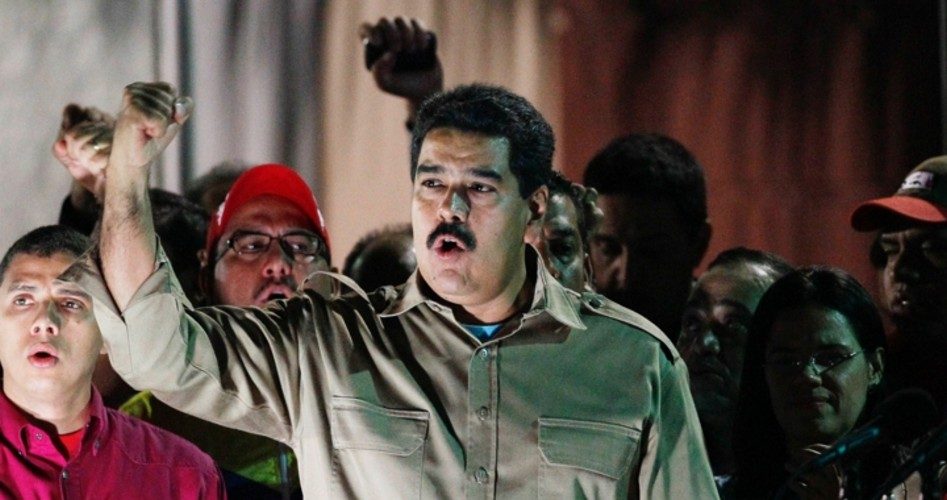
Thursday’s called strike could be the culmination of the rush of events leading to the successful removal of Venezuela’s Marxist dictator, Nicolas Maduro (shown). The strike called by Maduro’s political opposition is the “final offensive” in the months-long effort to depose him, according to Freddy Guevara, one of the opposition leaders. Said Guevara, “We are calling all the country to take part in a massive and violence-free protest through a nationwide strike for 24 hours,” adding that it would be a “mechanism for pressure and to prepare for the definitive escalation to take place next week.”
Last Sunday nearly 7½ million Venezuelans voted informally to protest Maduro’s plans to replace key members of the country’s legislative body, creating a “Constituent Assembly” that would lay the groundwork for rewriting the country’s constitution and cementing Maduro into office permanently. That vote is scheduled for Sunday, July 30.
One of those overseeing last Sunday’s plebiscite was the president of the University of Venezuela, Cecilia Garcia Arocha. She said the result of last Sunday’s vote “sent a clear message to the national executive [the Maduro regime] and the world.”
The world is listening. On Monday President Donald Trump issued this statement: “The United States will not stand by as Venezuela crumbles. [Citizens’] strong and courageous actions continue to be ignored by a bad leader who dreams of becoming a dictator.” Accordingly, the administration is preparing sanctions against Maduro’s defense minister, Vladimir Lopez, and Maduro’s Socialist Party’s Number Two official, Diosdado Cabello, for human rights violations.
Columbian President Juan Manuel Santos and Brazil’s President Michel Temer have also publicly expressed grave concerns over Maduro’s attempt to rewrite the country’s constitution.
The Trump administration is considering even more severe sanctions against Maduro, including crimping U.S. purchases of Venezuelan crude. At present the United States buys about half of Venezuela’s crude oil exports, providing a desperately needed flow of revenue to keep Maduro’s regime afloat. Cutting off that flow would have numerous repercussions, including giving credibility to Maduro’s charge of American “imperialism” that still rings true in the minds of many South American citizens. It would also potentially raise the price of gasoline for American drivers while strengthening Maduro’s resolve to stay in power.
There’s another movement afoot too: the creation of a “parallel” government by Guevara, who is calling it a “government of national unity.” It would be an alliance between longtime Maduro foes and dissidents from inside Maduro’s Socialist Party. They would include members of the military which to date Maduro has used to quell months-long protests that have resulted in the deaths of more than 100 citizens.
Opposition lawmaker Juan Andres Mejia pointed out: “This path that we’re forced to take carries risk. This state of national unity will not be recognized by everyone. The important thing is for it to be recognized by the people.”
It would also help if the United States were to officially recognize such a rogue startup, along with Venezuela’s neighbors. But that involves a constitutional question that few seem to be interested in raising. A White House spokesman told the Wall Street Journal, “We will do our best to try to avoid, of course, the negative impact on the U.S., as much as possible, but we will also not shy away from having impacts as needed if it’s in our international security interests.”
Just where in the Constitution is such unilateral intervention allowed? Does the phrase “international security interests” even show up in that document? By ignoring such limitations, does this officially turn the United States under the Trump administration into the world’s policeman? As horrific as the situation is in Venezuela, which The New American has documented, does this rise to the level of a direct “clear and present danger” to American sovereignty?
No one is asking these questions. Instead attention is being drawn to the national strike, called the “final offensive” by Maduro’s opposition, on Thursday to see if it, along with sanctions applied and threatened by the White House, will be sufficient to oust Maduro from power.
If it is successful and Maduro is removed, the next question must be asked: who, or what, will replace him? What are the chances that his replacement will be honorable and dedicated to restoring limited government and the rule of law to that unhappy country and its starving citizens? Or is Venezuela’s culture so completely rotted away by decades of socialism and dependency that Maduro’s replacement will look awfully similar in appearance and behavior?
Photo of Nicolas Maduro: AP Images
An Ivy League graduate and former investment advisor, Bob is a regular contributor to The New American magazine and blogs frequently at LightFromTheRight.com, primarily on economics and politics. He can be reached at [email protected].
Related articles:
Wondering Where the Money Went, Venezuelans Start Rationing Toothpaste
Starving Venezuelans Risk 60 Miles of Open Ocean to Barter for Food



